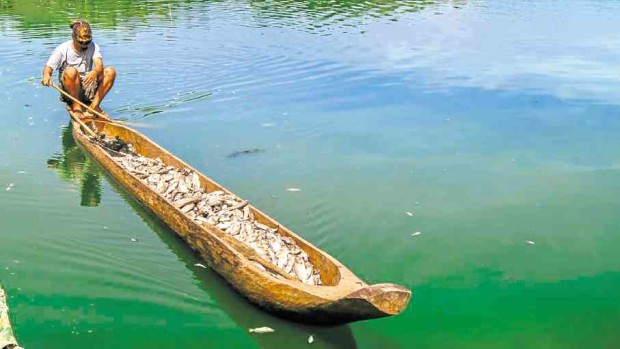Massive fish kill wipes out Lake Sebu’s tilapia stock

LAKE TRAGEDY A fisherman transports dead tilapia he gathered after a massive fish kill in Lake Sebu in South Cotabato province. —AMIEL CAGAYAN / CONTRIBUTOR
LAKE SEBU, South Cotabato—A massive fish kill has left this lakeside town, Central Mindanao’s largest tilapia supplier, gasping for air.
More than P120 million worth of tilapia grown in Lake Sebu was lost in what officials said was the worst fish kill to hit this town in years.
Authorities blamed heavy rain triggered by the tail end of a cold front and a low pressure area last month, spawning floods and turning the water turbid in the 354-hectare lake where the town got its name.
Mayor Antonio Fungan asked the local council to declare the town under a state of calamity to facilitate the release of calamity funds that the local government will use to help pen operators.
“[The fish kill] is unprecedented and unbelievable,” he said.
Article continues after this advertisementZaldy Artacho, municipal agriculture officer, said some 1,300 tons of tilapia and milkfish turned belly up since the fish kill started two weeks ago. A kilogram of tilapia sells for P90 to P100 in the local market.
Article continues after this advertisementJose Rudy Muyco, Lake Sebu fish warden, said the local government has yet to complete an audit of losses on the aquaculture industry here.
Unlike previous fish kills, including an incident in October last year, the recent fish kill killed all tilapia here, said Seigfred Flaviano, provincial environment officer, who led an inspection team in the lake on Wednesday.
“We did not see any live fish in the lake during the survey,” Flaviano said.
“Lake Sebu is … gasping,” Fungan said.
He asked Agriculture Secretary Emmanuel Piñol to help operators of 464 fish cages in the town.
As in the past, local officials cited the depletion of oxygen supply in the lake as the reason for the massive fish kill.
Lake Sebu has been experiencing light to moderate rain in the past two weeks, making the level of dissolved oxygen in the lake to drop fast.
Fungan also blamed pollutants from fish feed and other chemicals that runoff water carried into the lake for triggering the fish kill.
Mila Lorca, chief of the Provincial Disaster Risk Reduction and Management Office, said dead fish harvested from the lake should not be eaten.
Lorca said a massive cleanup drive should be undertaken to remove rotting fish in the water since these put the health of people living around the lake at risk.
South Cotabato Gov. Daisy Fuentes, in 2013, had called for a massive rehabilitation of the lake to avoid fish kills.
But Fuentes said residents should consider giving way and fish cage operators should agree to reduce the size of areas they occupy to save the lake.
Fuentes said residents living around the lake should also agree to move back a few meters so trees and bamboo could be planted on its rim.
“If they hold [property] titles, can we prod them to move back a little so we could plant trees and bamboo?” she asked.